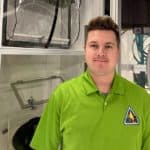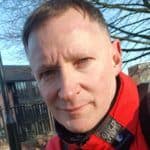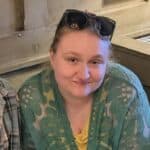Profile
Edd Bilbe
-
About Me:
I live and work just north of Reading. I normally cycle to work and I cook from scratch every day. I am dyslexic and very good at my job.
-
Read more
I was born in Reading and have a BSc and PhD in Chemistry from the University of Reading. I have always struggled with spelling and was diagnosed as dyslexic in my 1st year at university. I met my wife when I was 17 and we currently have two cats. I have been working for Johnson Matthey since 2012 as an X-ray Diffraction (XRD) analysts. I was the site manager for the Reading Beer and Cider festival for about 5 years.
I love nature and like to walk. When it is dark I look at the stars. I am interested in geology from landscape formation to rocks and minerals. I think fungi are fascinating. I see beauty in all these things. I take photos which capture how light interacts with nature including sun-rise, sun-sets, reflections and shadows.
I like to cook and can make anything but tend to stick to savoury dishes. I make sushi, curries, pasta, soufflé and beef wellington. If I make cakes I do not ice them.
-
My pronouns are:
Where possible use my Edd or Edd’s. Where it would be grammatically awkward he/him is ok.
-
My Work:
I prepare and test samples using X-ray Diffraction (XRD), then I explain the results to the person that made the sample. I am a bit like a cake tester because I help people improve their recipe.
-
Read more
Look in my typical day (continued) section for the real details.
I collect data using the three X-ray Diffractometers in our lab. One is set up to collect data from lots of different samples and has a robot to swap the samples after each 90 min scan. (~4000 samples a year) Another instrument collects sequential data sets from a single sample as we heat the sample up so it changes, we can flow different gases over the sample and this affects how they change. We try to mimic real world production or operational conditions and this give insight into how a catalyst is made and works. (~150 samples a year) The thirds instrument does a few different things like a Swish Army knife. It can collect data from small pellets.
If these can’t answer a question then we suggest other techniques in our department I like solid state nucleal magnetic resonance (SS-NMR) and electron probe micro analysis (EPMA) because they are both very complimentary to XRD. Thermo Gravametric Analysis (TGA) and Differential Scanning Calorimetry (DSC) are great to help with variable temperature XRD work. We can also send samples to central facilities including the Diamond Light Source (more X-ray stuff) and the Rutherford Appleton Laboratory (super cool neutron stuff) if the question needs it. The rule of thumb is do the least amount of work possible to get the answer which is needed.
-
My Typical Day:
I do not have a typical day and that’s what keeps my job interesting… The one rule is you need to be flexible and react to the most pressing demands.
-
Read more
At the end of my day I check my calendar for the next day and shut down my laptop. I walk to the XRD lab to check it will run over night and cycle home. No day is the same so it is good to be prepared!
I wake up, if I am tired and I don’t have to be in I go back to sleep. When it is time to get up I wear the first T-shirt out of the draw, I am on my bike in under 30 min and at work in 30 min after that. Breakfast is oatcakes at my desk. When I walk in I check on the lab if there has been an issue overnight I fix it.
I work in a team of 6 people. If I am on the lab rota I will check for samples which need data to be collected. If there are enough to fill a sample rack (15) I will put on my lab coat and get packing! If it is a lab handover day I empty the bin, this isn’t a glamourous job but it has to be done and it’s good to hand over a clean lab.
I also do data analysis, I start by looking for a phase matches using a data base of ~4000,000 different materials to see what is in the sample. XRD is sensitive to atomic structure so diamonds and graphite look different even through they are both made from carbon. Once we know what’s in a sample that might be enough or there could be further questions which require data fitting. Once I am happy I can answer the questions I write a short report with some figures to explain what I see.
If I have meetings they are normally to talk to people about what information they need from XRD or to explain a set of results.
-
What I'd do with the prize money:
I would give it back as I don’t have an idea I am sure of yet. If I had a plan the first step would be applying for company fund matching so I could do twice as much.
-
Education:
Aldrington Primary School tested for dyslexia and passed as not dyslexic.
Bulmershe Secondary School with 3 years of remedial spelling help. Got a GNVQ in business, GCSE’s included triple award science ABB, geography A, maths B, English Language B… D’s in French, English Literature and Religious Studies. Little to no revision needed.
Bulmershe Secondary School 6th form. A-levels in Chemistry C, Physics D, Maths U. As-levels in Maths C and English Lit. & Lang. C. Struggled a lot at this point in my life.
University of Reading BSc in Chemistry and knew I needed to work hard to get on. Never got to grips with organic chemistry but could think analytically and got on with the inorganic course. My finally year project was making mixed copper, silver cyanides.
I started a PhD in the same group looking at mixed copper, silver and gold cyanides. I solved the structures of platinum and palladium cyanide using neutron pair distribution function analysis.
-
Qualifications:
See above…
-
Work History:
I worked as a pharmacy assistant during my A-levels and undergraduate. Lots of people skills needed and an eye for detail. I worked at University graduations clearing tables and emptying bins. Easy money and free food.
I worked as a laboratory demonstrator during my in my PhD. This topped up the PhD funding and was a good opportunity to recruit good student to do their 3rd year projects in my group.
After my PhD I provided cover for 3 months of a University Lecturer doing tutorials and invidulating exams. Then I worked as a kitchen porter because it was easier than trying to sign onto unemployment. Again the free food was a bonus.
I was a post doctoral researcher for 11 months looking at making nano-fibers of cellulose from carrot waste as part of an EU project. The idea was these could be used to reinforce polymers. The project was behind when I started, I did long hours and made very little progress. This was my worst job.
Then I came to JM where my role has evolved. I have had 2 promotions whilst I was here and an now on a management pay scale but I do not have any people reporting to me. I am a company wide subject matter expert (SME).
-
Current Job:
My job title is a Principal Scientist. My business cards still say “XRD Analysts” which is what they said when I started as a Research Scientist 1 and still said when I was promoted to Senior Scientist.
Job titles don’t mean much especially outside of the company your in. The skills and experience are key. Reputation, integrity and solving problems are how I get recognition. I say how I can help, when I can and that I can’t if that’s true. I set expectations on when I will get things done and I meet those expectations.
-
Employer:
Johnson Matthey (JM) is a fine chemical company. It is 200 years old and started of as a secondary refiner of platinum group metals (PGMs = Rh, Ru, Ir, Pt, Pd, Au & Ag). Secondary refining is making pure metal from high loaded feedstocks from primary refining at mining operations and recycling material. They also make catalytic converters for cars which often contain PGMs. They supply catalysts for Fuel Cells (which make electricity form hydrogen and air using platinum) and electrolysers (which store energy by splitting water into hydrogen and oxygen using iridium) . We also work on other industrial catalytic processes.
JM was doing battery research for a while and did have a Heath business. We sold these bit of the business to focus on our PGM chemistry.
-
My Interview
-
What did you want to be after you left school?
I didn't know and I still didn't know when I finished my degree. Honesty is the best policy and many people don't so you are not alone.
Were you ever in trouble at school?
Not really. I got bullied a bit.
If you weren't doing this job, what would you choose instead?
I could teach. I could do XRD analysis for another company. As it stands I choose to be where I am now.
Who is your favourite singer or band?
depends on the mood, could be Jurassic 5, Cyprus Hill, DJ Marky or Andy C. Smashing Pumpkins, Reel Big Fish or Nirvana. Blues or Frank Sinatra.
What's your favourite food?
Variety is the spice of life but pizza is good.
If you had 3 wishes for yourself what would they be? - be honest!
I always wish for happiness. Look for the end goal not the means.
Tell us a joke.
This comment has been removed under our terms of service.
-






